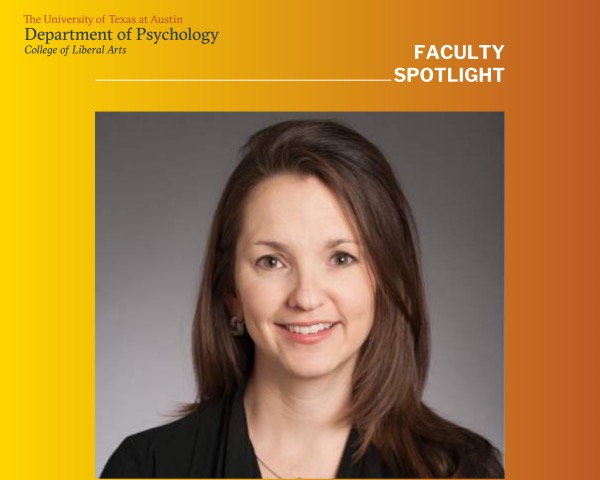This Q&A was originally published by UT Austin’s Department of Psychology. You can learn more about Dr. Lori Holt’s research here.
We are delighted to highlight Dr. Lori Holt, who joined the Department of Psychology faculty this past year as a professor. She received her Ph.D. from the University of Wisconsin-Madison. Since then, Dr. Holt has achieved excellent work in the auditory cognitive neuroscience field. Her work has been recognized and/or awarded by the James S. McDonnell Foundation, Acoustical Society of America, the American Speech, Language and Hearing Association, and the National Organization for Hearing Research, the National Academy of Sciences and many more.
In her personal time, Dr. Holt looks forward to taking advantage of Austin’s kayaking and hiking when the good weather returns.
Please tell us about your research.
I am interested in how we listen. From speech to music to the buzz of an incoming text message, the auditory system is always on, ready to inform. Everyday things like listening to a podcast or a classroom lecture seem effortless until you dissect the many processes that must happen to translate pressure waves in air molecules into meaning. I use the auditory system — and speech communication specifically — to better understand general processes in perception, learning, and attention.
What is the most unique or interesting facet of your research or its findings?
Those of us who study the auditory system work in the shadow of our big sister — vision. Undergraduate textbooks usually have 2 or 3 chapters on vision and one more on ‘the other senses.’ We are a much smaller field, and many really fundamental questions remain unanswered. This has made for a thriving (and, I think, welcoming) field that is progressing in interesting ways. The demands that sound puts on the brain are unique so studying them leads us to ask — and answer — different questions about cognition and perception.
Why is this work important? Whom will it affect?
Communication disorders are prevalent, and with age-related hearing loss a fact of life they will affect most of us at some point. Better understanding the cognitive and neurobiological systems that support speech communication informs our understanding and treatment of these disorders.
For example, dyslexia affects as many as 20% of people but there is little agreement on its origins, or how best to support those who have difficulty with reading. Our recent work has had a direct impact by revealing that dyslexia may have its origins in general learning mechanisms that are not specific to reading or language. This has implications for early detection because it might be possible to assess general learning processes before educators notice a child is struggling to read.
In other work, we have identified how to capitalize on auditory learning to promote second language learning in university classrooms, and to improve auditory attention in individuals with ADHD.
What drew you to this field?
I was drawn into research through an odd job that I picked up over the winter break. I spent 10 hours a day caring for Japanese quail. I fed the quail, weighed the quail, put them to work in an experimental box, and returned them to their home cage. It was honestly pretty dull work and I rarely saw another human in those long days. To fill the time while the quail did their work, I started to read about the research that motivated this study. At the time, speech perception was thought to be a uniquely human process. This study was part of the evidence that changed this thinking, broadening perspectives to understand speech perception as relying on general perceptual and cognitive processes. I got hooked on research and continued working in the lab through my undergraduate years and into graduate school.
What aspect of your work do you enjoy the most?
I really enjoy finding ways to bring teams of researchers together to tackle a question. Grant writing is my guilty pleasure (guilty, knowing how much some of my collaborators dread it). It’s not everyone’s cup of tea, but I really enjoy taking the opportunity to consider what comes next and to articulate a plan of action to get there.
What made you interested in coming to UT, and how are you finding it here?
I moved to Pittsburgh to become a faculty member at Carnegie Mellon University right out of graduate school. Time flies when you are having fun, and it was a good time for my family to try a new adventure. I was really impressed by the culture of the department, by the commitment to excellence by UT, and by exciting ways my research might be shaped by the new environment. We are finding Austin to be incredibly friendly, and the number of blue-sky, sunny days is life changing.
